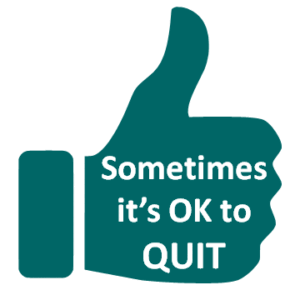“You got to know when to hold ’em, know when to fold ’em, know when to walk away, and know when to run.” – Kenny Rogers as The Gambler
Famed football coach Vince Lombardi once said: “Winners never quit, and quitters never win.” He embodies that indominable spirit that would never give up no matter how rough the road ahead. Dr. Angela Duckworth affirmed his sensibilities in Grit: The Power of Passion and Perseverance. Her research showed that grittier people experience more success, live longer, and enjoy healthier emotional lives.
 Best-selling author and international chess champion Annie Duke takes a different tack in Quit: The Power of Knowing When to Walk Away. She notes that while grit can help you stick to worthwhile enterprises, it can also keep you stuck in things that no longer merit your time, talents, and resources.
Best-selling author and international chess champion Annie Duke takes a different tack in Quit: The Power of Knowing When to Walk Away. She notes that while grit can help you stick to worthwhile enterprises, it can also keep you stuck in things that no longer merit your time, talents, and resources.
Let’s face it: We make decisions in the context of uncertainty. We don’t have all the facts up front. We can’t foresee the impact of good or bad luck. We can’t even predict how we’ll feel about things as we go along. Our goals and preferences may change. As such, quitting is an appropriate response when the expected value of further effort no longer passes the minimum threshold for sustained effort. It gives us the opportunity to invest in more profitable ventures and reach our goals faster.
Dukes acknowledges that most of us have trouble pulling the trigger on an initiative once we’ve gotten started. She identifies several impediments:
- When our present circumstances seem OK, we don’t engage in the requisite mental time travel to see how the future might shape up. We stick with the status quo and just keep on keeping on. Then when things start to go south…
- … we focus too much on what we’ve already invested (“sunk costs”) rather than keeping our eyes on future costs and benefits. And because we don’t want to close accounts in losses, we may double- or triple-down on our investments in the attempt to create some kind of win. Unfortunately, the greater the sunk cost, the harder it is for us to quit.
- It’s hard to quit when we feel a sense of ownership over the things, beliefs, and decisions that got us into the game. This “endowment effect” is particularly strong if we’ve built something from the ground up.
- There’s no feedback system to validate the wisdom of quitting. We can’t create alternate realities in which different choices play out. It makes us anxious to quit for fear that we might live to regret that decision.
- We like to cultivate a positive self-narrative. In our minds, quitting says we were wrong simply failed in execution. We may even tell ourselves that we just didn’t have what it takes to see it through.
These impediment plague all of us – even cognitive scientists whose research provides these insights. Duke offers these strategies for helping avoid the stayed-in-the-game-too-long pitfalls:
- Be really picky about the things to which you lend your commitment. Persevere only in things that matter, that bring you happiness, and that move you toward your goals. Set aside everything else to free up resources to pursue what matters. Stop sticking to things that weigh you down!
- Create a pre-commitment contract – states (measurable conditions or accomplishments) and dates (time frames for achievement) – that identifies requirements for staying the course. Then think about the conditions under which you would quit – a.k.a., “kill criteria.” Have an “unless clause” for every goal.
- Tackle to hardest part of the project first. The sooner you identify obstacles that aren’t worth your while (or even possible) to overcome, the sooner you can switch to something better.
- Have a Plan B (and perhaps C, D, and E) in your hip pocket to enable you to pivot quickly should conditions warrant a change. Hold fast to an exploratory mindset.
- Find someone who cares deeply about you and doesn’t have a problem telling you the cold, hard truth when the need arises. Take the blinders off and listen to what they say.
- Create a diversified portfolio of opportunities so that you aren’t overinvested in any one thing.
- Celebrate progress.
- Give yourself partial credit if you choose to stop something you started.
Bottom line: Life is too short to squander it on losing or unrewarding bets. Take it from a highly successful poker player:
“Contrary to popular belief, winners quit a lot. That’s how they win.”